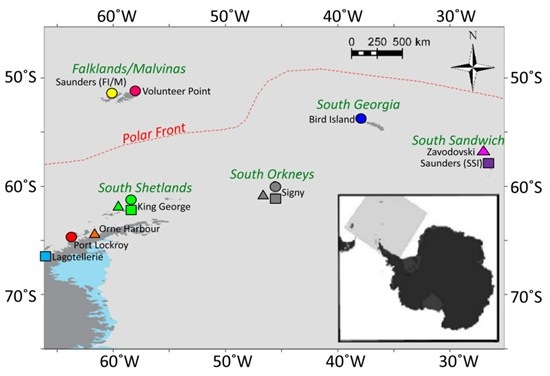Not so happy feet: Penguins feel the climate pinch
Life for penguins is getting tougher. Retreating sea ice around the Antarctic Peninsula is taking with it valuable habitat and food. But it wasn't always that way. In the past, these charismatic birds thrived as the climate warmed, according to new research that studies the history of penguin colonies in the region.
Now their fortunes have reversed. Current rapid warming caused by human activity means sea ice in the region is retreating too far and too fast. All but one penguin population on the Antarctic Peninsula is struggling to keep up, say the authors.
There's no escaping climate change on the vast continent of Antarctica. West Antarctica and the Antarctic Peninsula are among the most rapidly warming places on earth.
Icy grip
Antarctica has experienced big swings in temperature throughout earth's history. When ice cover peaked during the Last Glacial Maximum about 25,000 years ago, about twice as much sea ice encircled Antarctica as it does now.
Though that might suggest more space to fish and live, life as a penguin was difficult when there was more ice, according to research published in Nature Scientific Reports. Lead author Gemma Clucas from the University of Southampton explains:
"While we typically think of penguins as relying on ice, this research shows that during the last ice age there was probably too much ice around Antarctica … The extensive ice-sheets and sea ice around Antarctica would have made it inhospitable for them."
As the world emerged from the glacial maximum, temperatures rose, ice shelves retreated and penguins prospered. That's because the flightless birds need ice-free ground, explains co author Dr Tom Hart from Oxford University:
"As ice retreated, these penguins had access to more breeding sites and more open ocean to feed."
The researchers suggest the gradual warming and retreat of ice shelves as the world emerged from the LGM allowed penguin populations to expand as more habitat became available to the south.

The team studied penguin colonies across the Antarctic Peninsula and Scotia Arc. Circles are places where they sampled Gentoo penguins, triangles are Chinstrap penguins and squares are Adélie penguins. Colours are different populations. Source: Clucas et al. (2014)
A reversal of fortune
They may have coped with climate change in the past, but current warming isn't proving so positive for the plucky penguins, say the authors.
Only Gentoo penguins seem to still be managing reasonably well as temperatures rise, by opportunistically taking advantage of new suitable habitat for breeding, say the authors.
The less adventurous Chinstrap and Adélie penguins are diminishing in number around the Antarctic Peninsula, most likely due to the decline of their major food source, Antarctic krill.
Another theory is that more meltwater runoff is making the early life of Chinstrap and Adélie penguin chicks more perilous, and fewer are surviving into adulthood.
Too far, too fast
The warming we're seeing now is outside the natural range of variation that has occurred in the past, which is why we're seeing penguins respond very differently to how they did at the end of the LGM, the paper explains.
That's why it's important not to jump to the conclusion that a warming climate is good news for penguins, explains Hart:
"We are not saying that today's current warming is good for penguins, in fact the current decline of some penguin species suggests that the warming climate has gone too far for most penguins."
Clucas adds that many species are losing out to climate change too, so it's important to take a broad view:
"Despite historic warming clearly opening up new opportunities for penguins, we should not assume that current rapid warming caused by human activity is good for penguins as a whole. Evidence from other studies shows that climate change today is creating lots of losers and few winners".
Sometimes when it comes to predicting how species will respond to future warming, peering back into earth's recent past can help. The new study suggests penguin fortunes are perhaps one instance where to looking backwards to look forwards doesn't pay.
Originally published on Carbon Brief. Reproduced with permission.
















